State to compensate Sangre Grande gardener shot by 'moonlighting' cop

A 24-year-old Sangre Grande gardener will receive $375,000 in compensation for a wound to the abdomen he suffered when he was shot by a police officer.
The officer was allegedly moonlighting as a bouncer at a nightclub in Sangre Grande in 2015.
At the time, Avian Remy, of Vega de Oropouche, was 18. After he was discharged from the hospital, he was charged with assaulting the police officer, PC Anthony Prince.
The case against him flopped in the magistrates’ court and on Monday, after a short virtual trial, Justice Frank Seepersad found Prince had no justifiable reason to pull out his gun and shoot Remy.
In his lawsuit, Remy claimed he was dancing with the barmaid when Prince came up to him, held him by his jacket from behind and began dragging and slapping him. When he fell to the ground, the officer pulled out his gun, said, “I is police,” and then shot Remy.
The State, in its defence, claimed Remy and his friends scuffled with Prince, who was allegedly injured in the melee and had to pull out his personal gun and shoot Remy in self-defence.
Seepersad said the State's case lacked evidence, and there was also no explanation why Prince was at the nightclub if the State's only witness was an investigating officer, former ASP Bhojnarine Kandhai, who said Prince was not moonlighting at the club.
Neither Prince nor a barmaid testified at Monday's virtual trial.
Prince was said to be on pre-retirement leave.
The judge criticised the “shoddy investigation” done by the police before Remy was charged and said there was sufficient evidence to infer the charge was maliciously laid. He ordered general damages, aggravated damages for false imprisonment for three days, vindicatory and exemplary damages for Remy.
On the latter, which is supposed to deter wrongful conduct, Seepersad said the best deterrent was for offenders to feel it in their respective pockets.
He warned, “As long as the State continues to cover the damages to be paid out by officers who fail to discharge their obligations, very little would be done to curb that conduct. It is either they feel it or it is reflected in their files for promotion and advancement if we want to have a changing of attitude.”
He also said while it is accepted the police had a difficult and herculean task dealing with the crime situation, they must exercise patience and good judgment.
“There can be no room for impatience or reactionary behaviour because one’s feelings or sense of authority are hurt,” he said, also suggesting that officers should receive continuous psychological and emotional training and assistance.
He said the police had no inherent right to shoot any citizen they merely come in contact with, adding that the withdrawing and discharge of a firearm should only be in extreme circumstances to preserve life. In Prince’s case, he said there was nothing to justify the officer’s actions.
Seepersad also directed that the pleadings in the case and a copy of his ruling should be sent to the Commissioner of Police and the director of the Police Complaints Authority.
“As a civilised society, we must all be alarmed if there are circumstances in which an officer exceeds the remit of his jurisdiction and improperly discharges his firearm.”
He said Remy was fortunate to be alive, and there was nothing to suggest he was a danger or a threat to the officer on the night of April 18, 2005, at the Pearl Nightclub.
Remy was represented by attorney Tim Charriandy and Reynold Waldrop. The State was represented by Stefan Jaikaran of the Solicitor General’s Department.


Comments
"State to compensate Sangre Grande gardener shot by ‘moonlighting’ cop"